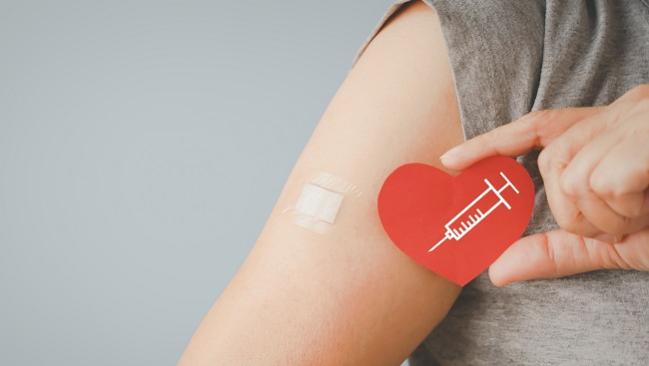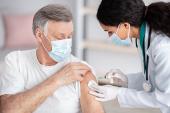No Increased MACE Following COVID-19 Vaccination in Adults With CVD
The data should help to ameliorate any vaccine hesitancy in patients with cardiovascular disease, a senior researcher says.

Vaccination for COVID-19 in Hong Kong was not associated with an increased incidence of MACE among people with cardiovascular disease, new observational data suggest.
The findings, specific to two different vaccine types, build upon others showing the safety of vaccinations across diverse groups and should bolster decision-making in patients who are hesitant because of preexisting cardiovascular disease, the authors say.
“At the time of the vaccination rollout in Hong Kong, there was a lot of vaccine hesitancy, especially among those with chronic health conditions, including those with cardiovascular diseases,” senior author Esther W. Chan, PhD (The University of Hong Kong, China), told TCTMD, estimating that this was “more prominent” in Asia than in Western countries.
The study included 41,492 people who received the Pfizer/BioNTech mRNA vaccine (Comirnaty) and 68,105 who received a whole inactivated virus vaccine (CoronaVac), made by China-based Sinovac Biotech.
Chan said she hopes their findings, published online this week in Cardiovascular Research, will “provide reassurance to clinicians and also to patients that, in general, [vaccination] would be considered safe.”
Pfizer/BioNTech and Sinovac Shots
For the study, Chan, Xuxiao Ye (The University of Hong Kong), and colleagues used electronic health records to obtain data on 229,235 adults with cardiovascular disease in Hong Kong who were vaccinated between February 2021 and January 2022. Among those vaccinated with the Pfizer/BioNTech vaccine, 88% had at least two doses, while that number dropped to 74% for those whose first dose was the Sinovac vaccine.
The primary outcome of MACE—defined as a composite of MI, stroke, revascularization, and cardiovascular death—was self-reported in 1,764 vaccinated adults within 27 days postvaccination. The researchers found no increased risk of MACE, however, between vaccinated and nonvaccinated adults.
MACE Incidence Rate Ratios by Vaccine
|
|
IRR |
95% CI |
|
BNT162b2 (Pfizer/BioNTech) |
||
|
First Dose 0-13 Days |
0.48 |
0.23-1.02 |
|
Second Dose 0-13 Days |
0.87 |
0.50-1.52 |
|
First Dose 14-27 Days |
0.40 |
0.18-0.93 |
|
Second Dose 14-27 Days |
1.13 |
0.70-1.84 |
|
CoronaVac (Sinovac) |
||
|
First Dose 0-13 Days |
0.43 |
0.24-0.75 |
|
Second Dose 0-13 Days |
0.73 |
0.46-1.16 |
|
First Dose 14-27 Days |
0.54 |
0.33-0.90 |
|
Second Dose 14-27 Days |
0.83 |
0.54-1.29 |
The results were maintained in subgroup analyses by sex, age, and underlying cardiovascular conditions.
Chan said the data, from a population made up primarily of adults living in South China, is likely broadly applicable. “We've been able to show that the vaccine is safe, but I think the data will still need to be replicated in other regions just in case there could be other factors that we don't yet know about,” she said.
Ultimately, these findings “should reassure patients and physicians, especially among those who are considering to be vaccinated,” Chan continued. “And regardless of which vaccine type, as long as they're vaccinated, it's still safer for them compared to not being vaccinated.”
She’d like to see future research delve into outcomes following vaccination among specific patient groups with CVD like heart failure and atrial fibrillation. If any differences are found, this may help specific patient groups make future decisions about boosters, she said.
Commenting on the findings for TCTMD, Jason Block, MD (Harvard Pilgrim Health Care Institute, Boston, MA), zeroed in on the results for the mRNA vaccine, since these have dominated vaccine rollouts in the US, as well as other Western countries. The “study demonstrates that vaccines do not appear to be associated with an increase in major cardiovascular events after mRNA vaccination among adults,” Block said in an email. “That's reassuring!”
Yael L. Maxwell is Senior Medical Journalist for TCTMD and Section Editor of TCTMD's Fellows Forum. She served as the inaugural…
Read Full BioSources
Ye X, Ma T, Blais JE, et al. Association between BNT162b2 or CoronaVac COVID-19 vaccines and major adverse cardiovascular events among individuals with cardiovascular disease. Cardiovasc Res. 2022;Epub ahead of print.
Disclosures
- Ye reports no relevant conflicts of interest.





Comments